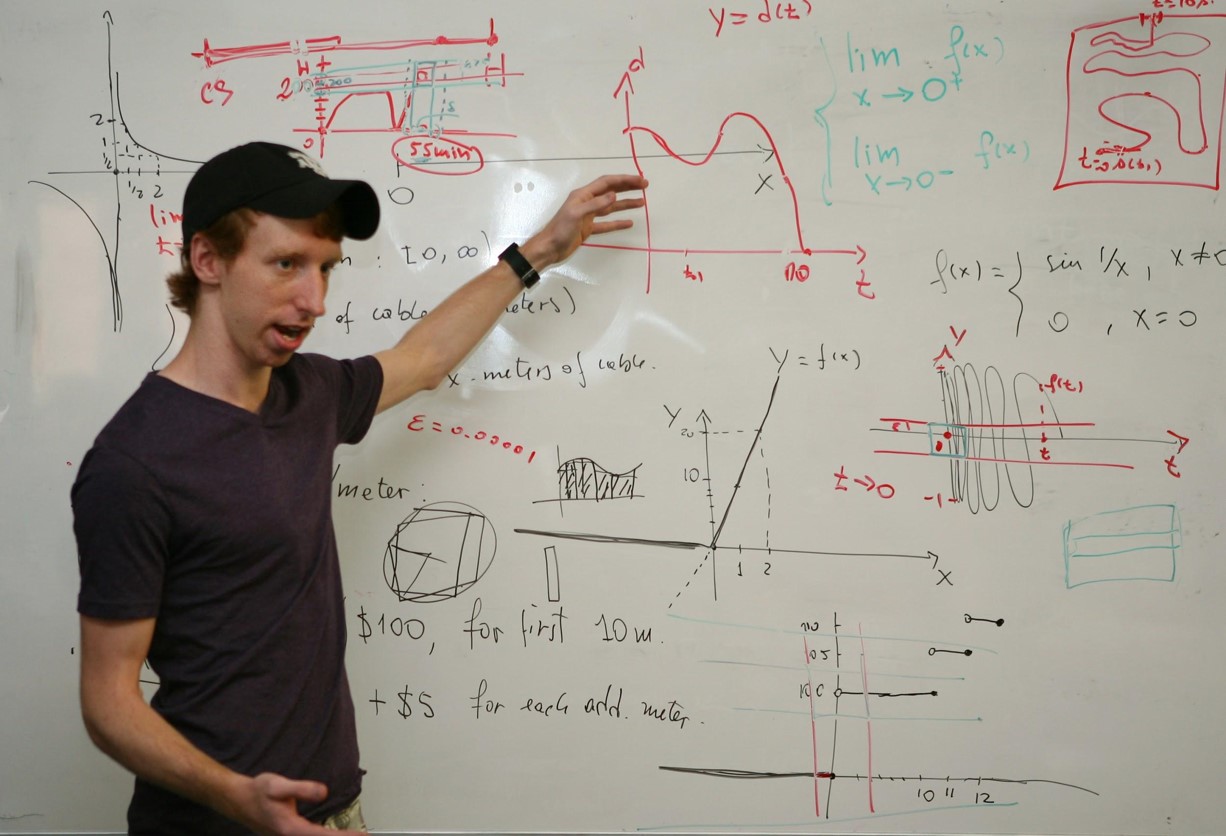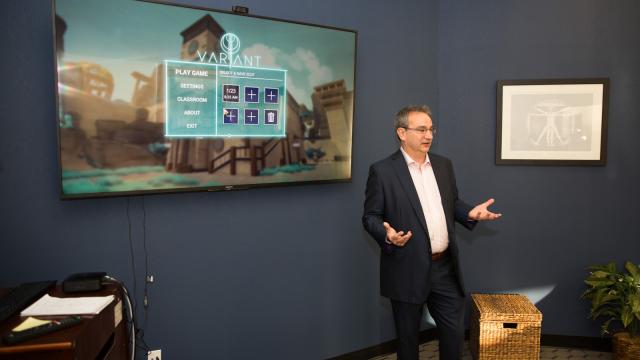CEO Andre Thomas talking about Variant: Limits. Photo courtesy of André Thomas.
On any given day, CEO André Thomas arrives at his company Triseum’s office in Bryan, Texas at nine in the morning. While this is when Thomas gets in, his work day usually starts hours before by checking sales on the company’s educational video games. On one of the days that Thomas and I spoke, he told me he had been “driving all day” to visit a university to answer questions and help students who were using Triseum’s games.
He says he usually tries to leave his office around seven, and even after eating dinner with his family, he’ll return to work for a few hours. In the past, he was Head of Graphics for EA Sports games like Madden NFL. Now, he runs Triseum, a company whose principal goal is to completely replace textbooks with video games.
After leaving EA in October 2013, Thomas and his business partner, Raul Khanorkar, the former CFO of EA Sports, attempted to create interactive museum displays, but that venture didn’t pan out the way that Thomas had expected. Basically, Thomas told me over the phone, “We realised that museums didn’t really have a lot of money to spend.”
Thomas moved from Florida to College Station, Texas, and took a position in the Department of Visualisation with Texas A&M. While working there, an art history professor approached him; the professor wanted to make an educational video game, but didn’t know how.
Inspired by this, Thomas launched the LIVE (Learning Interactive Visualisation Experience) Lab, which focuses on educational research and developing ways to incorporate gaming into the classroom experience.
“I wanted to engage with the students in a more meaningful way [than traditional lectures] and bring a more modern experience into the classroom to provide deeper context, and I wanted games to be part of this,” Thomas explained.
In a traditional classroom, Thomas said, a 90% means that you ace the class. But Thomas doesn’t think this is practical.
“What if I told you the pilot of the aeroplane that you’re about to get onto mastered 90% of the plane, and he or she did so by listening to someone on a stage talk to them, watching a video, or reading about it in a book? How comfortable are you going to be getting on that aeroplane?”
In reality, when pilots go to flight school, they fly simulated aeroplanes. Thomas sees no reason why games can’t be applied to more traditional subjects. “Why can’t we do the same thing in every other classroom, in physics, statistics, and maths? Why should students sit there and be bored out of their heads?” he said.
Thomas received a grant to work on his first game, ARTé Mecenas, a game about influencing art history, which came out in June 2016. He received an additional grant to develop Triseum’s 2017 calculus game, Variant: Limits. In the fall of 2014, he officially incorporated Triseum as a company. Today, Triseum continues to work closely with Texas A&M, but the company is privately owned.
“We licence research from them [A&M], and we’re working with them on the research side and the testing side, and we licence things that are being developed in the lab over there,” Thomas explained.
About 37 students, as well as faculty members, work in the LIVE Lab, and Triseum employs 30 people on its own. Students who work in the LIVE lab are paid; additionally, if anything they develop is commercialized, they receive royalty checks for the rest of their lives.
Both the LIVE Lab and Triseum have made diversity a focus: In the lab, the male to female ratio is at 50 per cent, and at the company it’s almost 40 per cent. This is a sharp contrast to other tech environments, where women comprise 30 per cent of the work force.

Photo courtesy of André Thomas.
“So A&M wins, the students and faculty win because they get paid and they get royalties, Triseum wins because all of our games are backed by research,” Thomas said. “[The games are] coming out of a lab where it’s been proven that they actually work, and they’re coming from the students, and they’re making the games for themselves.”
When Triseum sets out to make a game, they think about things that students struggle with, and then establish a learning objective, such as art history or calculus. After that, they figure out ways that they want to teach it.
“We try different things until we can marry engaging gameplay with learning objectives,” Thomas said. “But it always starts with learning, and then we craft the story, the game mechanics, around the learning experience. We continuously test and verify that it already works.”
Triseum draws inspiration from all kinds of games when they’re developing a product. “We’re looking really at everything from Mario Bros to Oregon Trail to the latest Call of Duty or Madden game,” Thomas said.
So far, the games have received an excellent response from educators and from students. “Students are engaged and talking about the subject matter and it’s a whole new experience for the teachers,” Thomas said.
Not only do students love them, Thomas says that Triseum can prove that they teach.
A study performed by Triseum found that their game Mecenas showed, according to Thomas, “24.7% improvement in students’ ability and knowledge after just 2 hours of gameplay… 24.7%. That’s 2 and a half grades better after just 2 hours of gameplay.” Thomas also said that another validation study is launching in five European countries to determine how the games can be used in high school classrooms.

Photo courtesy of André Thomas.
Although Triseum idealizes replacing textbooks with video games, Thomas clarified that the video games are not intended to replace teachers. The games come with tools for teachers that allow them to track student progress.
Thomas sees many benefits to using games instead of textbooks, including cost. A game from Triseum costs under 30 dollars, much less than a textbook. “You need four games to cover the same material as your 300 dollar textbook,” Thomas said. “But even with four games, you’re still saving over 60 per cent.”
Thomas also believes video games could potentially improve current graduation rates. In the United States, college graduation rates are on the rise, with 59% of students at 4-year institutions taking six years to graduate.
“Foundational subjects can be taught very effectively through video games in a shorter period of time and at a higher level of mastery,” Thomas said. “[Video games could be] reducing the time it takes students to graduate and reducing the costs to the students. Because if you can get college credit in four weeks [rather] than 16, guess what? Time to graduate goes down instead of 5 or 6 years [to receive an] undergraduate degree. Maybe we can get back to 4 years or 3 years.”
Triseum’s games are now part of art history and calculus curriculums at more than 200 universities. But while Triseum is aiming to make strides in educational games, they also face barriers.
Despite educational games’ longstanding history in the gaming world — Oregon Trail came out an entire year before the revolutionary Pong did — there is still a stigma surrounding them.
“Many people we talked to when they hear learning games, their eyes glaze over, like ‘They’re not fun’ or ‘Yeah, they’re fun but they don’t teach you,’” Thomas explained.
People in academia are gradually coming around to recognising the potential and effectiveness of video games in a learning environment.
Recently, Thomas was appointed to join the advisory board for the National Academy of Sciences’ Koshland Public Engagement Program. With acceptance from the highest levels of academia, perhaps the stigma against educational video games can be broken down.
“Learning games aren’t new,” Thomas said. “Learning games, if done right, can be very effective and live a long time. I believe our games speak for ourselves, and we want to revolutionise education.”

Comments
5 responses to “The Company That Wants To Replace Textbooks With Video Games”
So the “proof” that they work was research done by the company itself.
Okay yeah, nah, I’ll wait for independent verification.
To be fair I can see some of this being useful for practical environments. In my field (nursing and paramedics) setting up game-like scenarios (particularly with VR) would be beneficial – we already use case studies to help us learn, so making it into a game isn’t such a big leap. But trying to shoehorn less practical fields into a game doesn’t seem like a good fit. More than that, at some point you’re probably going to hit up a text of some sort to get background information or fundamentals down pat. Even in a practical degree there’s still lots of reading to do before you can properly practice.
There’s already too much overstimulation in education as it is.
We know from many actual studies that people absorb information better when not distracted by lots of excess stimuli. Yes, boring lectures are boring, but sitting in boring lectures without being distracted by an assault on all five senses results in very good outcomes for long term information retention.
Where studies have found some apparent benefits to multimedia in the classroom they tend to focus on the short term outcomes only – students staring attentively at the pretty lights during class demonstrating student ‘focus’ and improvements on tests assessing learning within a few hours of the class session.
Studies that have looked at how much of that information is retained in the longer term aren’t anywhere near as promising. The brain simply isn’t as good as we sometimes credit it at retaining the stuff we are trying to teach (eg calculus) when that information is competing with the more entertaining and emotional reactions of an associated light and sound show.
Multimedia vs traditional teaching is more or less the equivalent of cramming the night before the test versus actually learning the material comprehensively over a full semester.
The only exception to this is that practical skills can be taught effectively if the simulation is sufficiently comprehensive and immersive, think automobile repair or animal dissection.
Boring lectures don’t work though…I remember plenty of lectures where I paid attention for maybe the first 10 minutes and then didn’t get anything out of it after that because I was falling asleep or mindlessly copying down notes of what the lecturer was writing without listening to what they were saying. I know it was ineffective because when I went back later and read them for revision I had no idea what it was going on about…so I pull out the text book and figure it out for myself.
Ends up being that 90% of the lectures I went to were pretty much a waste of time. Different people learn differently – being spoken at for an hour doesn’t help me learn anything.
It is true that people have different learning styles, but what is consistent is that over stimulation is detrimental to long term memory retention. Reading a textbook has the advantage of not being associated with sensory overload in the same way as traditional lectures – writing is typically just black and white words on a page, which helps one to focus.
It’s also true that the information being conveyed has to be informative to start with. If the lecturer, textbook or multimedia presentation isn’t well designed and doesn’t actually convey the learning material effectively it doesn’t matter the medium. Sadly it is true to say that the world is full of poor quality lecturers, just as it is full of poor quality ‘educational games’.
Finally, an interesting problem in the design and assessment of educational outcomes is that researches have found that students will typically make up for poor quality education by teaching themselves outside of class. This makes it very hard to measure the effectiveness of different styles of education as even poor quality qualifications nonetheless tend to produce broadly competent graduates. Go figure.
Yeah, my point is just that traditional lectures taught by lecturers who have many degrees in their field but little or none in teaching tend to be a poor way for people to learn…go figure. I spent 4 years at uni for an engineering degree, something like 10-12 subjects per year, potentially 48 different lecturers in that time. There was less than that as some double up…but the amount of “good” lecturers was maybe 5 or 6…that was 5 or 6 subjects where I could actually learn from the lectures. One of those was a CAD course so the lectures themselves basically introduce the tools and you learn by using the software so cross that one off…
I’m sure there’s a trade off between something being engaging and stimulating verses something being over stimulating and bombarding you with too much. Lectures rarely manage to find the balance point there, games on the other hand have a much better chance. Hard to knock them without seeing what this company has produced. Just because the majority of educational games are poorly made it doesn’t mean these are…they’re making them in conjunction with students who are using them to learn which is more than any others have likely ever done.